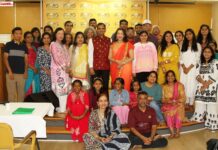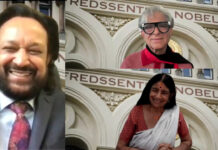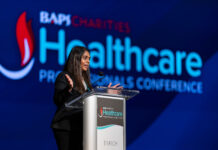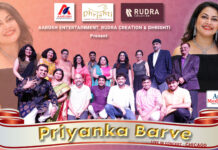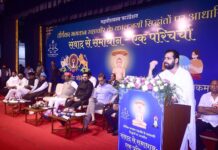
CHICAGO, IL: Padmashree Sudha Ragunathan thrilled both connoisseurs of Carnatic music and those keen on experimental fusion by leading an ensemble that took liberties with traditional compositions while singing at the Hindu Temple of Greater Chicago (HTGC) in Lemont, on Sunday, May 5.
Ragunathan was accompanied by Amit Heri (lead guitar), B. Raghavendra Rao (violin), Tiruvarur Vaidyanathan (mridangam), Guruprasad (ghatam), Arun Kumar (drums), and Keith Peters.
The concert was a part of the tour emanating from the movie Morning Raga (2004), which culminated in lead actress Shabana Azmi rendering Thaaye Yashoda sung by Ragunathan in a manner that strikes a chord in the hearts of even those otherwise not attuned to Indian classical music. Amit Heri had intended to popularize Carnatic music beyond its narrow circle of connoisseurs and many fans came away feeling that this powerful rendering of the emotional bond between mother and son perhaps overshadowed the narrative interest.
Following the invocatory prayer by an HTGC temple priest and welcome address by Dr Ram Bala, the concert began with Muttuswami Dikshitar’s energetic Mahaganapatim in raagam Nattai, followed by Harikesha Nallur Mutthaiah Bhagavathar’s set composition (varnam) in raagam Khamas.
India Funk, composed by Heri to celebrate the affinities among the diverse musical genres of the world, especially jazz and Carnatic, gave violinist Rao ample leeway to depart from strict traditional boundaries while echoing and responding to the lead guitar.
Introducing the underlying concept, Ragunathan had praised Heri for fusing contemporary styles, such as jazz, into the movie’s sound tracks even while preserving the uniqueness of the original Carnatic ragas and the character of the individual compositions
Oothukadu Venkata Subbaiah’s much awaited Thaaye (O Mother) Yashoda in the plaintive raagam Thodi, with its innovative fusion rendering blurs the distinction between divine and worldly expressions of childhood waywardness and parental love (vaatsalya). While retaining the undiminished flavor, even exact phrases, from the original score, the ensemble greatly expanded the treatment that was now capped by a full-fledged percussion exchange.
Annamacharya’s Brahmam Okate in raagam Bhowli that followed the intermission proved so popular that Ragunathan was obliged to sing it again just before the end, the second time with full audience participation, clapping, singing, and even dancing. There followed a languid jazzy rendering of several Sanskrit prayers, such as Guru Stotram and Upanishadic Asato Maa Sat Gamaya, in raagam Hamsadhvani.
Gandhian statesman C. Rajagopalachari’s rare Tamil composition Kurai Ondrum Illai (“No grievance have I”) in Raaga Maalikaa, touched the hearts of all. A natural choice for this fusion concert, the lilting “English Note” popularized by Madurai Mani Iyer blended seamlessly into Thyagaraja’s Sita Kalyanam in raagam Shankaraabharanam. After Purandara Dasa’s Bhaagyadaa Lakshmi Baramma in raagam Pantuvaraali (in Madhyama shruti) and repeat of Brahmam Okate, a Balamurali Krishna thillaana aptly concluded the concert.
The artistes were honored with shawls and gift baskets. HTGC Fine Arts Committee Coordinator Usha Pariti, while giving the vote of thanks, announced the rich variety of classical programs that HTGC was hosting over the next couple of months.
This “national integration” tour of ten North American cities is organized by the Cleveland Aradhana Committee that brought the whole ensemble over from India. Ragunathan was also introduced as Founder of Samudhaaya Foundation, which has supported health care for underprivileged children to the tune of Rupees 1.25 crore ($300,000) over the course of twelve years.
Asian Media USA

